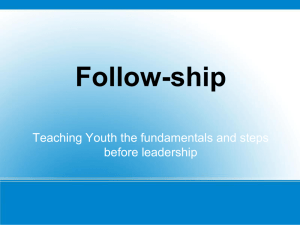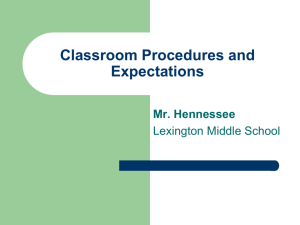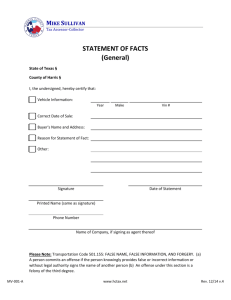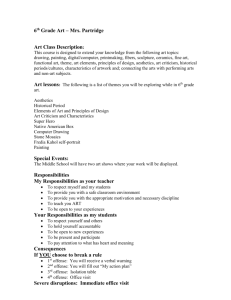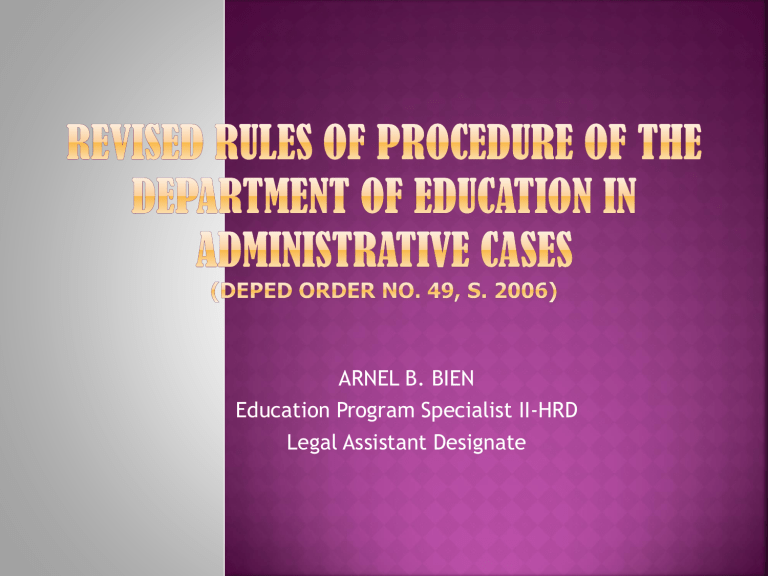
ARNEL B. BIEN Education Program Specialist II-HRD Legal Assistant Designate 1987 Constitution – Section 1 – The State shall protect and promote the right of all citizens to quality education at all levels, and shall take appropriate steps to make such education accessible to all. Section 5(4) – The State shall enhance the right of teachers to professional advancement. Non-teaching academic and non-academic personnel shall enjoy the protection of the State. R.A. 4670 otherwise known as the Magna Carta for Teachers Sec. 1. Declaration of Policy. It is hereby declared to be the policy of this Act to promote and improve the social and economic status of public school teachers, their living and working conditions, their terms of employment and career prospects in order that they may compare favorably with existing opportunities in other walks of life, attract and retain in the teaching profession more people with the proper qualifications, it being recognized that advance in education depends on the qualifications and ability of the teaching staff and that education is an essential factor in the economic growth of the nation as a productive investment of vital importance. As used in this Act, the term "teacher" shall mean all persons engaged in classroom teaching, in any level of instruction, on fulltime basis, including guidance counselors, school librarians, industrial arts or vocational instructors, and all other persons performing supervisory and/or administrative functions in all schools, colleges and universities operated by the Government or its political subdivisions; but shall not include school nurses, school physicians, school dentists, and other school employees. Safeguards in Disciplinary Procedure. Every teacher shall enjoy equitable safeguards at each stage of any disciplinary procedure and shall have: a. the right to be informed, in writing, of the charges; b. the right to full access to the evidence in the case; c. the right to defend himself and to be defended by a representative of his choice and/or by his organization, adequate time being given to the teacher for the preparation of his defense; and d. the right to appeal to clearly designated authorities Public office is a public trust. Public officers and employees must at all times be accountable to the people, serve them with utmost responsibility, integrity, loyalty, and efficiency, act with patriotism and justice and lead modest lives. Secretary – for disciplinary actions and administrative cases against officers and employees of the DepEd at its Central Office and against Presidential appointees; namely: Assistant Superintendents, Superintendents, Asst. Regional Directors, Regional Directors, Asst. Secretaries and Undersecretaries Original and exclusive jurisdiction Subject for confirmation, disapproval and modification by the President Regional Directors – for cases against teachers and against their personnel at their respective regional offices Superintendents – for non-teaching personnel in their respective divisions Dishonesty Oppression Neglect of Duty Misconduct Disgraceful and immoral conduct Being notoriously undesirable Discourtesy in the course of official duties Inefficiency and incompetence in the performance of official duties Receiving for personal use of a fee, gift or other valuable thing in the course of official duties or in connection therewith when such fee, gift or other valuable thing is given by any person in the hope or expectation of receiving a favor or better treatment than that accorded other persons or committing acts punishable under the anti-graft laws. Conviction of a crime involving moral turpitude. Improper or unauthorized solicitation of contributions from subordinate employees and by teachers or school officials from school children. Violation of existing Civil service Law and Rules or reasonable office regulations. Falsification of official documents. Frequent unauthorized absences or tardiness in reporting for duty, loafing or frequent unauthorized absences from duty during regular office hours. Habitual drunkenness. Gambling prohibited by law. Refusal to perform official duty or render overtime service. Disgraceful, immoral or dishonest conduct prior to entering the service. Physical or mental incapacity or disability due to immoral vicious habits. Borrowing money by superior officers from subordinates or lending by subordinates to superior officers Lending money at usurious rates of interest. Willful failure to pay just debts or willful failure to pay taxes due to the government. Contracting loans of money or other property from persons with whom the office of the employees concerned has business relations. Pursuit of private-business, vocation or profession without the permission required by the Civil Service rules and regulations Insubordination. Engaging directly or indirectly in partisan political activities by one holding a non political office. Conduct prejudicial to the best interest of the service Lobbying for personal interest or gain in legislative halls or officers without authority Promoting the sale of tickets in behalf of private enterprises that are not intended for charitable or public welfare purposes and even in the latter cases if there is no prior authority Nepotism as defined in Section 59, Chapter 8, Subtitle A, Title , Book V of E.O. No. 292 Sexual harassment as defined and penalized under CSC Resolution No. 01-0940. - - In Philippine Amusement and Gaming Corporation v. Rilloroza [G.R. No. 141141, June 25, 2001], dishonesty is defined as the disposition to lie, cheat, deceive, or defraud; untrustworthiness; lack of integrity; lack of honesty, probity or integrity in principle; lack of fairness and straightforwardness; disposition to defraud, deceive or betray. (Balagso, Teodoro Jr. L., CSC Resolution No. 991085, May 21, 1999 citing Briones, Rolando A., Res. 97-3740 dated Aug. 28, 1997) “The concealment or distortion of truth, which shows lack of integrity or a disposition to defraud, cheat, deceive or betray and an intent to violate the truth.” CSC Resolution No. 95-2125, March 21, 1995 define Oppression as an act of cruelty, severity, unlawful exaction, denomination or excessive use of authority. Negligence is want of care required by the circumstances. It is a relative or comparative, not an absolute term, and its application depends upon the situation of the parties, and the degree of care and vigilance which the circumstances reasonably impose. Neglect of duty is the failure of an employee to give one’s attention to a task expected of him and is censurable under the Civil Service rules. Gross neglect of duty denotes a flagrant and culpable refusal or unwillingness of a person to perform a duty.(Phil. Retirement Authority vs Thelma Rupa, GR No. 140519, 8/21/2001) -means intentional wrongdoing or deliberate violation of a rule of law or standard of behavior. To constitute an administrative offense, misconduct should relate to or be connected with the performance of the official functions and duties of a public officer. In grave misconduct, as distinguished from simple misconduct, the elements of corruption, clear intent to violate the law or flagrant disregard of an established rule must be manifest. Teachers are duly licensed professionals who must not only be competent in the practice of their noble profession, but must possess dignity and a reputation with high moral values. They must strictly adhere to, observe, and practice the set of ethical and moral principles, standards, and values laid down in the Code of Ethics of Professional Teachers, which apply to all teachers in schools in the Philippines, whether public or private, as provided in the preamble of the said Code. Section 8 of Article VIII of the same Code expressly provides that “a teacher shall not inflict corporal punishment on offending learners”.(Alberto Patog, Sr. vs CSC, GR No. 198755, 6/5/2013) (Memorandum Circular No. 15, s. 2010, 8/5/10) -refers to an act which violates the basic norm or decency, morality and decorum abhorred and condemned by the society. It refers to conduct which is willful, flagrant or shameless and which shows a moral indifference to the opinions of the good and respectable members of the community. CLASSIFICATION A. Disgraceful and Immoral Conduct in the Workplace-Conduct committed by parties, regardless of marital status, under any of the following circumstances: 1. The disgraceful and immoral conduct was committed in the workplace in a scandalous manner. 2. The disgraceful and immoral conduct was committed by taking advantage of one’s position and/or with the use of government property and resources. 3. The disgraceful and immoral conduct affected the work performance of the respondents. CLASSIFICATION B. Disgraceful and Immoral Conduct Committed through a Forbidden Relationship- is classified under this section if the parties are engaged in a relationship forbidden by law. C. Disgraceful and Immoral Conduct Committed through Inherently Immoral Acts- Conduct which consists of immoral ad deviant acts inherently forbidden by the basic norms of decency, morality and decorum such as, but not limited to incest, pedophilia, exhibitionism and the like, whether committed in a discreet or scandalous manner within or out of the workplace. This offense is based mainly on the general reputation of an employee for being difficult to work with, due to his/her quarrelsome attitude and/or repeated infractions of office rules. The focus in this offense is the totality of his conduct in office and not his liability for the individual acts. (Laguilles, Cesar P., CSC Resolution No. 99-0026, 1/6/1999 (In re: Basa, 41 Phil. 275;In re: Isada, 60 Phil 915) Everything which is done contrary to justice, honesty, modesty or good morals. It (moral turpitude) implies something immoral in itself, regardless of the fact that it is punishable by law or not. It is not the prohibition by statute that fixes moral turpitude but the nature of the act itself. (Robredillo, Mario, CSC Resolution No. 00-0657, 3/10/2000 citing Dela Torre vs COMELEC, 258 SCRA 483) Falsification as a rule is the misrepresentation of a thing, fact or condition, certifying that a thing is true when it is not, whether one has the right to make the representation or certificate. As applied to a public document, in order that said act be punishable, it is immaterial whether it has caused damage to a third person or not. This is because falsification of public documents is controlled by other principles distinct from those applicable to private documents. ( US vs Buenaventura , 1Phil 433) The accomplishment of a PDS is required under Civil Service Rules and Regulations for employment in the government. The making of an untruthful statement therein amounts to dishonesty and falsification of official document that warrant dismissal from the service even on the first offense.(Admin. Case for Dishonesty and Falsification, 463 Phil. 878, 890) As emphasized in Advincula vs. Dicen, (GR No. 162403, 5/16/2005, 458 SCRA 696), the PDS is an official document required of a government employee and official by the Civil Service commission. It is the repository of all information about any government employee and official regarding his personal background, qualification, and eligibility. The term “election campaign” or “partisan political activity” refers to an act designed to promote the election or defeat of a particular candidate/s to a public office. (Bugtong Diosdado, CSC Res. No. 97-0807) Incompetency has been defined as the manifest lack of adequate ability and fitness for the satisfactory performance of official duties. This has reference to any physical, moral, or intellectual quality the lack of substantially incapacities one to perform the duties of an officer. (Sec. 8, PD 971) -is a deliberate and willful refusal to comply with a lawful request or order of a higher authority. It involves disregard or proper authority and a refusal to obey that authority, a will disrespect of it.(Sobrepeña , Carmelita G., CSC Resolution No. 001288) -as an administrative offense is defined as an act, or series of acts, involving any unwelcome sexual advance, request or demand for a sexual favor, or other verbal or physical behavior of a sexual nature, committed by a government employee or official in a work related, training or education related environment of the person complained of. -as a criminal offense is defined as a work, education or training related act committed by an employer, employee, manager, supervisor, agent of the employer, teacher, instructor, professor, coach, trainor or any person who, having authority, influence or moral ascendancy over another in a work or training or education environment, demands, requests or otherwise requires any sexual favor from the other, regardless of whether the demand request or requirement for submission is accepted by the object of said act. 1st offense – Dismissal 1. Dishonesty 2. Gross Neglect of Duty 3. Grave Misconduct 4. Being Notoriously undesirable 5. Conviction of a crime involving moral turpitude 6. Falsification of official documents 7. Physical or Mental incapacity or disability due to immoral or vicious habits 8. Engaging in directly or indirectly in partisan political activities by one holding non-political office 1st offense – Dismissal 9. Receiving for personal use a fee, gift or other valuable thing in the course of official duties or in connection therewith when such fee, gift or other valuable thing is given by any person in the hope or expectation of receiving A favor or better treatment than that accorded to other persons, or committing acts punishable under the anti-graft laws 10.Contracting loans of money or other property from persons with whom the office or employee has business relations 1st offense – Dismissal 11. Soliciting or accepting directly or indirectly, any gift, gratuity, favor, entertainment, loan or anything of monetary value which in the course of his official duties or in connection with any operation being regulated by, or any transaction which may be affected by the functions of his office. The propriety or impropriety of the foregoing shall be determined by its value, kinship, or relationship between the giver and the receiver and the motivation. A thing of monetary value is one which is evidently or manifestly excessive by its very nature. 1st offense – Dismissal 12. Nepotism 13. Disloyalty to the Republic of the Philippines and to the Filipino People 1st Offense – Suspension (6 mos., 1day to 1 year); 2nd Offense – Dismissal 14. Oppression 15. Disgraceful and Immoral conduct 16. Inefficiency and Incompetence in the performance of official duties 17. Frequent unauthorized absences, or tardiness in reporting for duty, loafing or frequent unauthorized absences from duty during regular office hours. 1st Offense – Suspension (6 mos., 1day to 1 year); 2nd Offense – Dismissal 18. Refusal to perform official duty 19. Gross insubordination 20. Conduct prejudicial to the best interest of the service. 21.Directly or indirectly having financial and material interest in any transaction requiring the approval of his office. Financial and material interest is defined as pecuniary or proprietary interest by which a person will gain or lose something. 1st Offense – Suspension (6 mos., 1day to 1 year); 2nd Offense – Dismissal 22. Owning, controlling, managing or accepting employment as officer, employee, consultant, counsel, broker, agent, trustee, or nominee in any private enterprise regulated, supervised or licensed by his office, unless expressly allowed by law. 23. Disclosing or misusing confidential or classified information officially known to him by reason of his office and not made available to the public, to further his private interests or give undue advantage to anyone, or to prejudice the public interest. 1st Offense – Suspension (6 mos., 1day to 1 year); 2nd Offense – Dismissal 24. Obtaining or using any statement filed under the Code of Conduct and Ethical standards for Public Officials and Employees for any purpose contrary to morals or public policy or any commercial purpose other than by news and communications media for dissemination to the general public. 25.Recommending any person to any position in a private enterprise which has a regular or pending official transaction with his office, unless such recommendation or referral is mandated by 1)law, or 2) international agreements, commitments and obligation, or as part of the function of his office. 1st Offense –Suspension for one (1) month and one (1) day to six (6) months; 2nd offense – Dismissal 1. Simple Neglect of duty. 2. Simple Misconduct 3. Gross Discourtesy in the course of official duties 4. Violation of existing Civil Service Law and rules of serious nature. 5. Insubordination 1st Offense –Suspension for one (1) month and one (1) day to six (6) months; 2nd offense – Dismissal 6. Habitual Drunkenness. 7.Unfair discrimination in rendering public service due to party affiliation or preference. 8. Failure to file SALN, and disclosure of business interest and financial connections including those of their spouses and unmarried children under 18 years of age 1st Offense –Suspension for one (1) month and one (1) day to six (6) months; 2nd offense – Dismissal 9. Failure to resign from his position in the private business enterprise within thirty (30) days from assumption of office when conflict of interest arises, and/or failure to divest himself of his shareholdings or interest in private business enterprise within sixty (60) days from assumption of public office when conflict of interest arises; Provided, however, that for those who are already in the service and conflict of interest arises, the official or employee must either resign or divest himself of said interest within the periods herein above; provided, reckoned from the date when the conflict of interest had arisen. 1. 2. 3. 4. Discourtesy in the course of official duties1st offense – reprimand; 2nd offense – suspension for 1 to 30 days; 3rd offensedismissal Improper or unauthorized solicitation of contribution from subordinate employees and by teachers or school officials from school children. Violation of reasonable office rules and regulations Frequent unauthorized tardiness. 1st offense – reprimand; 2nd offense – suspension for 1 to 30 days; 3rd offense-dismissal 5. Gambling prohibited by law 6. Refusal to render overtime service. 7. Disgraceful, immoral or dishonest conduct prior to entering the service. 8. Borrowing money by superior officers from subordinates. 9. Lending money at usurious rates of interest. 10. Willful failure to pay just debts or willful failure to pay taxes due to the government. 1st offense – reprimand; 2nd offense – suspension for 1 to 30 days; 3rd offensedismissal Just debts shall apply to: 1. 2. Claims adjudicated by a court of law, or Claims the existence and justness of which are admitted by the debtor. 1st offense – reprimand; 2nd offense – suspension for 1 to 30 days; 3rd offense-dismissal 11. Lobbying for personal interest or gain in legislative halls and offices without authority. 12. Promoting the sale of tickets in behalf of private enterprises that are not intended for charitable or public welfare purposes and even in the latter cases, if there is no prior authority. 13. Failure to act promptly on letters and request within fifteen (15) days from receipt, except as otherwise provided in the rules implementing the Code of Ethical Standards for Public Officials and Employees. 1st offense – reprimand; 2nd offense – suspension for 1 to 30 days; 3rd offense-dismissal 14. Failure to process document and complete action on documents and papers within reasonable time from preparation thereof, except as otherwise provided in the rules implementing the Code of Conduct and Ethical Standards for Public Officials and Employees. 15. Failure to attend to anyone who wants to avail himself of the services of the office, or act promptly and expeditiously on public transactions. 1st offense – reprimand; 2nd offense – suspension for 1 to 30 days; 3rd offensedismissal 16. Engaging in private practice of his profession unless authorized by the Constitution, law or regulation, provided that such practice will not conflict with his official functions. 17. Pursuit of private business, vocation or profession without the permission required by Civil Service rules and regulations.
